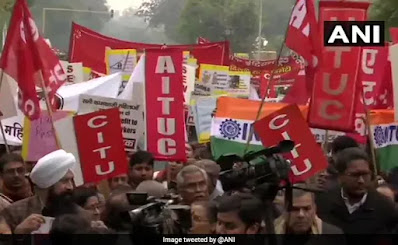People’s Lockdown Today
 |
| A scene from the Jan strike |
The government kept the
country locked down for three-quarters of a year. Now the people have called
for a lockdown of their own. Today is a national strike called by all the trade
unions together except Bharatiya Mazdoor Sangh which is affiliated to RSS. What
are the grievances of the people, the working class?
First of all, we should
remember that this is the second such strike called all over the country. The
first was on 8 Jan which saw 30 crore workers joining in. India’s total labour
force, including the workers in agriculture, is 56 crore. So the figure of 30
crore is significant. Also remember that the farmers have been agitating in
many parts of the country in the last many months, Punjab being the latest
example.
BJP may keep winning elections
(who knows how?) but people aren’t happy with them. That’s quite obvious. Why?
Let us look at some of the problems raised by today’s strikers.
In the last strike – the January
one – the workers wanted better remunerations. Rs 21000 per month is the minimum
salary they are demanding. Quite fair when we compare that sum with those taken
home by our government executives, politicians, endless staff of the
politicians, and other government staff. I’m purposely leaving out the private
sector which is not doing quite well these days in spite of the sops given them
generously every now and then.
Though the private sector isn’t
doing well at all, the government is keen to privatise almost everything in the
country – from railways and airports and harbours to forests and banks and
rivers. The country is being sold piece by piece. This was the second grievance
of the strikers in Jan. Stop selling the country.
The first strike’s impact was
stolen by the pandemic that succeeded it immediately. Everyone experienced
helplessness to some degree or the other. The government declared three
packages to help out. None of these packages helped the labourers. They helped
the corporate sector. Obviously, the labourers felt betrayed by the government.
[They voted for the same government in the recent elections, however. One of
the infinite mysteries that plague Indian politics!]
The tragic truth is that the
Modi government took the pandemic as an opportunity for implementing their
hidden agendas. For example, the 29 labour laws were transmuted into 4 codes
which regulate wages, industrial relations, social security, and occupational
security. In the process job security just disappeared. You can be fired at any
time from your job. one of Modi sarkar’s many gifts to you.
The public sector in India is
crumbling because of the government’s eagerness to sell the country to Ambanis
and Adanis. The package declared for BSNL was actually for asking the workers
there to take voluntary retirement and go home. BSNL is merging into Ambani’s infinite
private property. Much of India is Ambani’s private property already.
The sheer insensitivity of the
government towards the working class may be illustrated by the fact that while
the minimum wage in the country is a paltry Rs202, the management is given the
power to cut eight days’ wages if a worker strikes work one day. That is how
the government cares for the labourer!
Today’s strike is a fight for
survival. It is a reminder to the government that its callousness revealed
during the lockdown exodus won’t be acceptable anymore. Ensure the welfare of
the struggling poor by giving unemployment allowances and food articles. Repeal
anti-labourer laws. Support labourers. Make them pensionable too.
The demands are justified. A
country shouldn’t belong to the minority of the rich and the privileged.
Frankly, in a long time, India sees a series of meaningful protest. It is soothing to know that finally, people have realised who governs them and exploits their beliefs. I feel glad that the people have begun to stand up for their rights after ages. But ultimately the power of people lies in the ballot, unfortunately, where people choose with their emotions. They get a golden opportunity once every five years that gets wasted away. So at the end of the day, I believe such strikes help to make a stand but fail to bring results.
ReplyDeleteAgree totally on this. The ballot is the final solution.
Delete